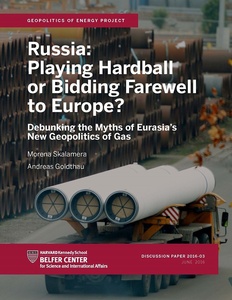Russia: Playing Hardball or Bidding Farewell to Europe? Debunking the Myths of Eurasia’s New Geopolitics of Gas
Discussion Paper, Belfer Center for Science and International Affairs
June 2016
Authors: Morena Skalamera, Associate, Geopolitics of Energy Project, Andreas Goldthau, Associate, The Geopolitics of Energy Project
Belfer Center Programs or Projects: Geopolitics of Energy Project
Steel pipes originally bound for Russia’s cancelled South Stream gas pipeline project are transported at the Mannesmann steel mill in Muelheim, Germany, 04 December 2014.
Roland Weihrauch/picture-alliance/dpa/AP Images
INTRODUCTION
One of the great questions of energy geopolitics over the last few years has been the nature and extent of Russia’s shift in export strategy away from Europe. The year 2014 arguably marked the end of Gazprom’s multi-decade business model in Europe. In May 2014, the state-controlled natural gas producer, inked a deal worth USD 400 billion to supply Russian gas to China. In November 2014, through a memorandum of understanding, Gazprom pushed the Altai pipeline to service the Asian markets instead of Europe. Finally, in December 2014, it cancelled plans for South Stream—a pipeline project once viewed as a key to locking down the European market and, that same month, announced Turkish Stream, a pipeline aimed at circumventing the transit country Ukraine, and the expansion of Nord Stream, a Russian–German link, through the Baltic Sea.
Little attention, however, has been paid to the causal drivers and the implications of Russia’s alleged shift in export strategy away from Europe and toward the East. Our paper redresses this neglect by determining whether Russia has indeed completely refashioned its strategy to gradually transition away from the European market. This question necessitates a thorough investigation of Gazprom’s reaction to a set of factors that threaten its position in the European gas market and, in turn, an assessment of key factors driving future European supply structures. This paper aims to do just that; it explores the extent to which this new Russian export strategy is real, and to the extent that it is, it investigates the drivers of the new approach in terms of timing, substance, and the prospects for this new approach to succeed. To this end, this discussion paper relies on a set of background interviews with policy makers, industry representatives, and analysts in Russia and Brussels.
- Read a short summary of this discussion paper here. (328K PDF)
- Download the full paper here. (2.8 MB PDF)
Republished with the kind permission of the Belfer Center for Science and International Affairs



